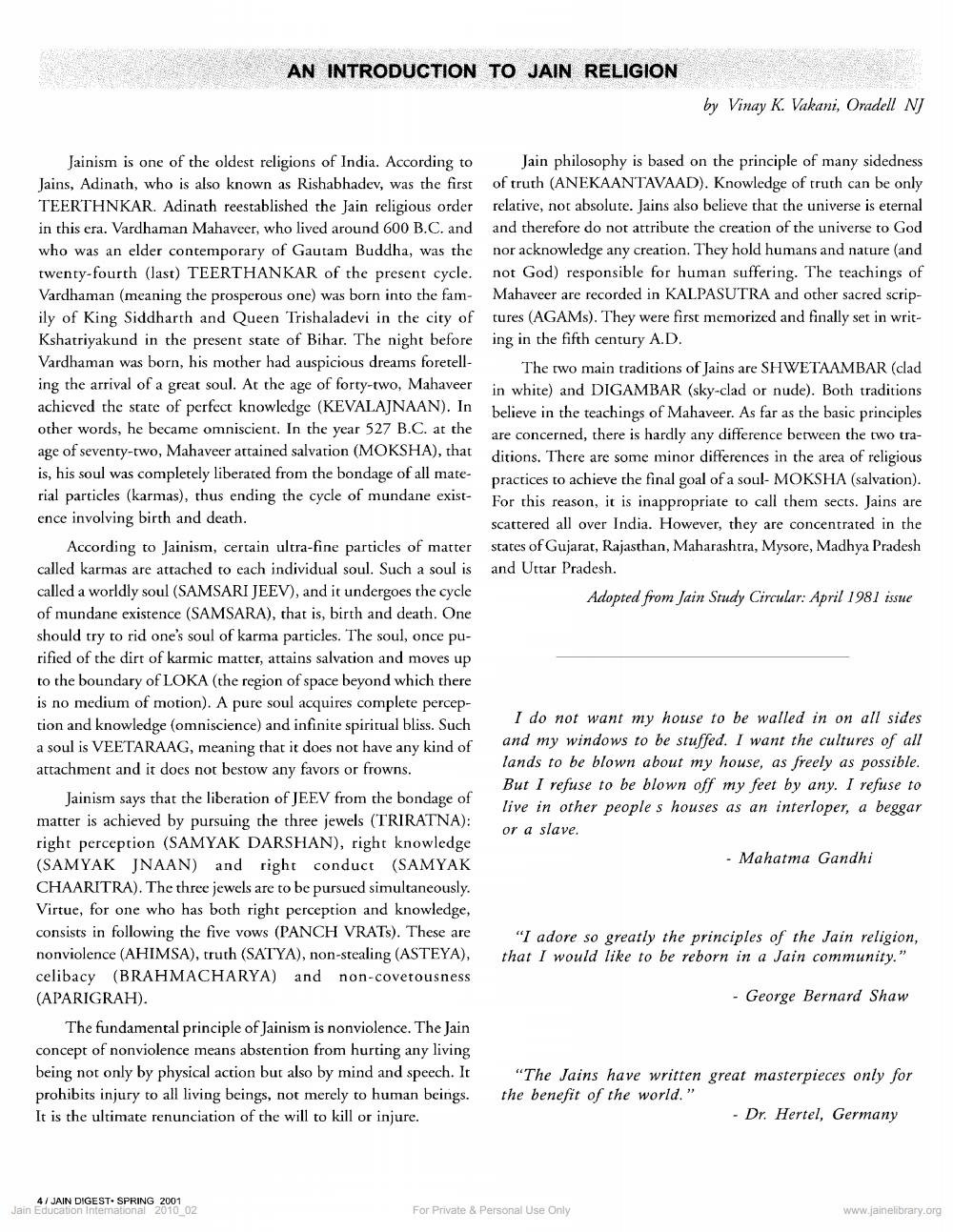Book Title: Jain Digest 2001 01 Vol 17 No 01 Author(s): Federation of JAINA Publisher: USA Federation of JAINA View full book textPage 6
________________ AN INTRODUCTION TO JAIN RELIGION Jainism is one of the oldest religions of India. According to Jains, Adinath, who is also known as Rishabhadev, was the first TEERTHNKAR. Adinath reestablished the Jain religious order in this era. Vardhaman Mahaveer, who lived around 600 B.C. and who was an elder contemporary of Gautam Buddha, was the twenty-fourth (last) TEERTHANKAR of the present cycle. Vardhaman (meaning the prosperous one) was born into the family of King Siddharth and Queen Trishaladevi in the city of Kshatriyakund in the present state of Bihar. The night before Vardhaman was born, his mother had auspicious dreams foretelling the arrival of a great soul. At the age of forty-two, Mahaveer achieved the state of perfect knowledge (KEVALAJNAAN). In other words, he became omniscient. In the year 527 B.C. at the age of seventy-two, Mahaveer attained salvation (MOKSHA), that is, his soul was completely liberated from the bondage of all material particles (karmas), thus ending the cycle of mundane existence involving birth and death. According to Jainism, certain ultra-fine particles of matter called karmas are attached to each individual soul. Such a soul is called a worldly soul (SAMSARI JEEV), and it undergoes the cycle of mundane existence (SAMSARA), that is, birth and death. One should try to rid one's soul of karma particles. The soul, once purified of the dirt of karmic matter, attains salvation and moves up to the boundary of LOKA (the region of space beyond which there is no medium of motion). A pure soul acquires complete perception and knowledge (omniscience) and infinite spiritual bliss. Such a soul is VEETARAAG, meaning that it does not have any kind of attachment and it does not bestow any favors or frowns. Jainism says that the liberation of JEEV from the bondage of matter is achieved by pursuing the three jewels (TRIRATNA): right perception (SAMYAK DARSHAN), right knowledge (SAMYAK JNAAN) and right conduct (SAMYAK CHAARITRA). The three jewels are to be pursued simultaneously. Virtue, for one who has both right perception and knowledge, consists in following the five vows (PANCH VRATS). These are nonviolence (AHIMSA), truth (SATYA), non-stealing (ASTEYA), celibacy (BRAHMACHARYA) and non-covetousness (APARIGRAH). The fundamental principle of Jainism is nonviolence. The Jain concept of nonviolence means abstention from hurting any living being not only by physical action but also by mind and speech. It prohibits injury to all living beings, not merely to human beings. It is the ultimate renunciation of the will to kill or injure. 4/JAIN DIGEST SPRING 2001 Jain Education International 2010_02 by Vinay K. Vakani, Oradell NJ Jain philosophy is based on the principle of many sidedness of truth (ANEKAANTAVAAD). Knowledge of truth can be only relative, not absolute. Jains also believe that the universe is eternal and therefore do not attribute the creation of the universe to God nor acknowledge any creation. They hold humans and nature (and not God) responsible for human suffering. The teachings of Mahaveer are recorded in KALPASUTRA and other sacred scriptures (AGAMs). They were first memorized and finally set in writing in the fifth century A.D. The two main traditions of Jains are SHWETAAMBAR (clad in white) and DIGAMBAR (sky-clad or nude). Both traditions believe in the teachings of Mahaveer. As far as the basic principles are concerned, there is hardly any difference between the two tra ditions. There are some minor differences in the area of religious practices to achieve the final goal of a soul- MOKSHA (salvation). For this reason, it is inappropriate to call them sects. Jains are scattered all over India. However, they are concentrated in the states of Gujarat, Rajasthan, Maharashtra, Mysore, Madhya Pradesh and Uttar Pradesh. Adopted from Jain Study Circular: April 1981 issue I do not want my house to be walled in on all sides and my windows to be stuffed. I want the cultures of all lands to be blown about my house, as freely as possible. But I refuse to be blown off my feet by any. I refuse to live in other people s houses as an interloper, a beggar or a slave. Mahatma Gandhi "I adore so greatly the principles of the Jain religion, that I would like to be reborn in a Jain community." - George Bernard Shaw For Private & Personal Use Only "The Jains have written great masterpieces only for the benefit of the world." - Dr. Hertel, Germany www.jainelibrary.orgPage Navigation
1 ... 4 5 6 7 8 9 10 11 12 13 14 15 16 17 18 19 20 21 22 23 24 25 26 27 28 29 30 31 32 33 34 35 36 37 38 39 40 41 42 43 44 45 46 47 48 49 50 51 52 53 54 55 56
